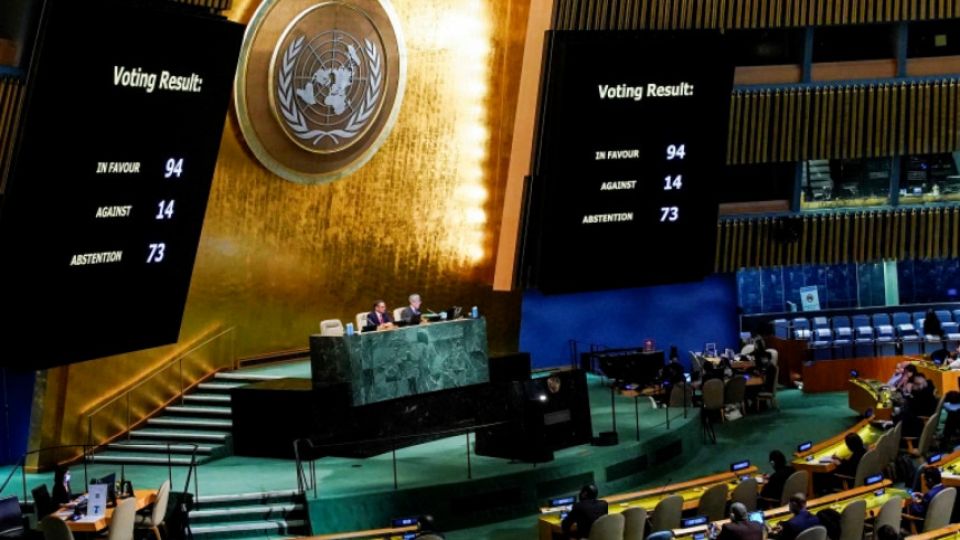November 16, 2022
DHAKA – Bangladesh abstained from voting in the UN General Assembly that adopted a resolution calling for Russia to be held accountable for violating international law by invading Ukraine.
The resolution, which was passed on Monday, also ordered Moscow to pay reparations to Kyiv for damages, loss and injury resulting from the war.
Of the assembly’s 193 members, 94 voted in favour of the resolution, which recommends the assembly’s member nations in cooperation with Ukraine create “an international register” to document claims and information on damage, loss, or injury to Ukrainians and the government caused by Russia.
Fourteen voted against and 73 nations abstained including India, Pakistan, Sri Lanka, Vietnam, Nepal, Bhutan and Malaysia.
Those voting against the resolution were Belarus, China, Cuba, North Korea, Iran, Russia and Syria.
It was the lowest level of support of the five Ukraine-related resolutions adopted by the General Assembly since Russia’s February 24 invasion. General Assembly resolutions are non-binding, but they carry political weight.
Bangladesh voted in favour of the previous resolution passed in October defending the territorial integrity of Ukraine as per the principles of the UN charter.
That came after Bangladesh in March demanded aid access and civilian protection in Ukraine and criticised Russia for creating a “dire” humanitarian situation with its invasion.
However, Bangladesh abstained from voting in March for another resolution that demanded Russia stop the aggression on Ukraine and immediately withdraw from the country.
Bangladesh’s explanation of vote for the resolution on Monday could not be obtained.
But India, in its explanation of vote, questioned whether a reparation process would contribute towards efforts at resolving the conflict and cautioned against precedents being set through such resolutions.
In presenting the resolution, Ukrainian Ambassador Sergiy Kyslytsya insisted that Russia must be held accountable for its violations of international law.
He outlined the impact of the Russian war on his country, including bombings targeting residential buildings and infrastructure, the demolition of nearly half of the power grid and utilities, massive displacement, and atrocities such as murder, rape, torture and forced deportations.
“Seventy-seven years ago, the Soviet Union demanded and received reparations, calling it a moral right of a country that has suffered war and occupation. Today, Russia, who claims to be the successor of the 20th century’s tyranny, is doing everything it can to avoid paying the price for its own war and occupation, trying to escape accountability for the crimes it is committing.”
Russia also supported the creation of the UN Compensation Commission (UNCC), established in 1991 following Iraq’s invasion and occupation of Kuwait, Kyslytsya said.
“This proposal is not about Russia alone. It will work for the benefit of all those who are being threatened now or might be threatened later by use of force,” Kyslytsya added.
Speaking before the vote, Russian Ambassador Vasily Nebenzya characterised the draft resolution as “a classic example” of a narrow group of states acting not on the basis of international law, but rather trying to consecrate something that is illegal.
He said countries backing the resolution were attempting to position the General Assembly as a judicial body, which it is not.
“These countries boast about how committed they are to the rule of law, but at the same time, they are flouting its very semblance,” he added, speaking in Russian.
The proposed reparations mechanism will be created by a group of countries that will decide how it functions, Nebenzya said.
“The UN will play no role in this process because the proposed mechanism is suggested to be created outside of the UN, and no one has any plans to account to the General Assembly for its activity.”
Furthermore, he had “no doubt” that the funding will come from frozen Russian assets, which total billions.
Western countries have long wanted to unfreeze these assets, he said, not to return them to their owner, or to spend them on helping Ukraine, “but rather so as to fund their own constantly growing weapons supplies to Kyiv, and covering the debts for the weapons already supplied.”
In his nightly video address, Ukrainian President Volodymyr Zelenskyy said: “The reparations that Russia will have to pay … are now part of the international legal reality.”
But Kremlin spokesman Dmitry Peskov on Tuesday said Russia stands “categorically against” the proposal, adding that Moscow would do “everything possible” to stop the West from seizing its frozen international reserves or “plundering” them to pay for reparations to Ukraine.


